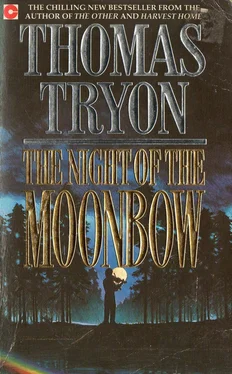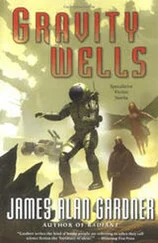Thomas Tryon - The Night of the Moonbow
Здесь есть возможность читать онлайн «Thomas Tryon - The Night of the Moonbow» весь текст электронной книги совершенно бесплатно (целиком полную версию без сокращений). В некоторых случаях можно слушать аудио, скачать через торрент в формате fb2 и присутствует краткое содержание. Жанр: Триллер, на английском языке. Описание произведения, (предисловие) а так же отзывы посетителей доступны на портале библиотеки ЛибКат.
- Название:The Night of the Moonbow
- Автор:
- Жанр:
- Год:неизвестен
- ISBN:нет данных
- Рейтинг книги:3 / 5. Голосов: 1
-
Избранное:Добавить в избранное
- Отзывы:
-
Ваша оценка:
- 60
- 1
- 2
- 3
- 4
- 5
The Night of the Moonbow: краткое содержание, описание и аннотация
Предлагаем к чтению аннотацию, описание, краткое содержание или предисловие (зависит от того, что написал сам автор книги «The Night of the Moonbow»). Если вы не нашли необходимую информацию о книге — напишите в комментариях, мы постараемся отыскать её.
The Night of the Moonbow — читать онлайн бесплатно полную книгу (весь текст) целиком
Ниже представлен текст книги, разбитый по страницам. Система сохранения места последней прочитанной страницы, позволяет с удобством читать онлайн бесплатно книгу «The Night of the Moonbow», без необходимости каждый раз заново искать на чём Вы остановились. Поставьте закладку, и сможете в любой момент перейти на страницу, на которой закончили чтение.
Интервал:
Закладка:
Dagmar presented her cheek, but her tone was tart as she returned his greeting.
“Hello yourself, renegade. I said you’d probably put in an appearance as soon as food was in the offing. Here’s Fritz; say hello to him.”
Reece and Fritz exchanged strained greetings; then Dagmar introduced Reece to the professor. “Reece is Leo’s counselor,” she explained. “We’re just about to sit down,” she said to Reece. “It might be nice if you joined us.” “Sure, why not?”
“Leo and Fritz will be with us, too,” she added.
“An interesting lad you have there,” the professor said to Reece. “Very bright.”
“Oh, sure,” Reece returned easily. “We’re expecting big things from Leo. Very big.” He glanced at Fritz, then grinned at Dagmar. “If it’s all the same to you, on second thought I think I’ll just eat with the hoi polloi and leave Leo to astonish you and the professor on his own-” Dagmar drew her chin down. “Very well, counselor; if that is your wish, do by all means. Go along, go along, try to keep the boys from throwing food; they seem quite boisterous today.”
As Reece trotted down the steps, Dagmar escorted her guests into the pergola, where they seated themselves at the round glass-topped table.
“A handsome young man, very intelligent-looking. Tell me something about him,” Professor Pinero said, unfolding his napkin and laying it across his lap. “Is there some difficulty between him and our young camper?”
Dagmar hesitated, turning the ring on her finger while considering, then, including Fritz in her remark, she said: “I don’t think ‘our young camper,’ as you call him, is exactly Reece’s notion of a proper Moonbow camper.” She glanced down to where Reece leaned against the parapet, talking to a group of boys. “He sometimes – Qu’est-ce qu’on peut dire de ce jeune homme?” she said to Fritz.
“Madame is finding it hard to be tactful,” Fritz explained. “Though one of our camp mainstays, Reece is sometimes forceful and demanding in his expectations of people.” “But Leo is a good camper,” Dagmar said firmly. “It’s not easy for a boy of his background to fit in with a pack of savages like these.” She laughed indulgently at the boisterous crowd.
Leo returned to the table with spotless hands, and no sooner had he settled into his chair than Augie arrived with a tray of tempting-looking lobster salads, which he set out on the table with tall glasses of iced tea. When he disappeared, Dagmar used the tines of her fork to poke among the leaves of Hartford Bronze lettuce, turning over bits and pieces of lobster and celery, checking the quality of their preparation. She ate with precision, chewing each mouthful carefully and patting her lips with her napkin at intervals.
While the adults made small talk, Leo endeavored to keep his eyes on his plate, employing his cutlery as best he knew how and listening to the conversation. He learned several interesting bits he had not been aware of before. One, Dagmar had not been a childless wife, as Leo had assumed, but had borne a son, who had died in the Great War, at Ypres.
“But having lost my own boy,” she said, “I have found so many other boys to take his place, which is why I enjoy having them running about our castle. They make me merry, and I’m glad I’ve got them back.”
Then Fritz disclosed that two Swiss Red Cross officials, who were expected to arrive in Washington, D.C., some time next month, might have word about his family. He hoped to be able to talk with them.
From time to time the professor’s friendly look would make sure to include Leo, as if to say, Isn’t it nice that we can share this bit of time together? But what was he doing here? Obviously Dagmar had invited him for some reason; he hadn’t just dropped in out of the blue.
Leo’s hand made a sudden, almost involuntary movement toward his water goblet, and instead of taking it by the stem he knocked it over. The water spilled across the tabletop and dripped between the glass and the wrought-iron frame.
“It’s all right, no harm done,” said Dagmar, mopping up, while Fritz shifted his gaze to the sky, which had turned a darker, more ominous shade.
“I wonder if our fine day hasn’t ended?” he murmured. The wind had freshened and the trees were showing the pale undersides of their leaves.
Dagmar, too, scanned the heavens for signs. “Rain, Augie?” she asked.
“Didn’t I say?” Augie replied. “Barometer’s droppin’.”
“And not a word in the paper. Perhaps you’d better close a few windows. Now,” she went on, briskly rubbing her palms together and looking first at Fritz, then at the professor, “I think perhaps it is time for us to have a little music, eh? What do you say, Leo, shall we go along and see if my Pleyel is in good tune?” She leaned toward him to scrutinize him more closely. “Leo, are you all right? You’re not ill, are you?”
“No.”
“Good. Shall we move, then, to the music room? Professor Pinero is eager to hear you play. I want everything to go exactly as I have planned it.”
Leo slipped a sidelong glance at Fritz, and another over the parapet to Reece in the driveway. Catching the look, Reece smiled up amiably, that amazing little trick of his. Leo felt his hands getting clammy. It was no use, he couldn’t play; stubbornly he shook his head, his eyes riveted on the monogrammed napkin on his lap. There was a long pause, during which he felt all eyes on him and he wished the earth might open and swallow him up.
“Very well, then,” Dagmar said at last, and, flinging Fritz an exasperated look, she went to the railing and called down to the other campers, telling them to come along, it was time for “a spot of music.” As they came trooping up the stairs, she shooed them in the direction of the music room. “Come in, boys, come in, don’t be shy,” she cried, leading the way as knots of them hung about in the various doorways, reluctant to intrude into so hallowed a place.
While Fritz waited, Leo dawdled on the terrace, concentrating on the view. Overhead a flock of crows winged past the tower, veering steeply to disappear among the trees down in the glen, while from far up the valley, north of Moonbow Lake, there came a solitary clap of thunder that rolled out of the gathering clouds like the distant peal of a bronze bell and died away into nothingness.
“Leo?” Fritz prompted. “You remember what we talked about? You have been given a valuable gift-you must make the most if it. You want to play, you know you do. I can see it in your face.”
It was true. He was feeling little feverish flickers of excitement, and an undeniable pleasure, but at the same time his fingers felt hot and swollen, and his stomach was churning. If only Reece weren’t here.
Fearing the worst, he left the parapet with Fritz, and joined the stragglers leaping over the threshold to the music room, shuffling to distribute themselves, some on the soft, plumpy furniture, Reece and the Jeremians scattered along the window seats, the rest on the Oriental rugs dotting the floor. The professor was ensconced in a tall-backed chair, and while Leo squeezed in between Tiger and the Homln, Fritz, his cap tipped back on his head, perched himself. imp the woodpile between two doors.
Finally, when the last camper had hunkered down in a corner, Dagmar, standing in the bow of her piano, welcomed the newest visitors to the Castle and remembered the old ones. Then, shedding her fingers of their rings, she seated herself on the bench, checked the pedals, and raised her hands over the keyboard to begin. Leo recognized the selection at once: Tchaikovsky’s “Marche Slave,” a sonorous piece that brought out the best that the Pleyel had to offer.
Despite the arthritis in her fingers, Dagmar played expertly, with grace and elan, and as she played she looked over the top of the music rack and smiled at Leo; in that smile he read a variety of things: wishing and disappointment, and the fleeting expression of a stout will that seemed to be telling him that any musician who could execute such lyric passages should never be thwarted, only encouraged to play, and that music – oh, such music – was the soul’s balm; let no one stand in the way of its purest expression.
Читать дальшеИнтервал:
Закладка:
Похожие книги на «The Night of the Moonbow»
Представляем Вашему вниманию похожие книги на «The Night of the Moonbow» списком для выбора. Мы отобрали схожую по названию и смыслу литературу в надежде предоставить читателям больше вариантов отыскать новые, интересные, ещё непрочитанные произведения.
Обсуждение, отзывы о книге «The Night of the Moonbow» и просто собственные мнения читателей. Оставьте ваши комментарии, напишите, что Вы думаете о произведении, его смысле или главных героях. Укажите что конкретно понравилось, а что нет, и почему Вы так считаете.












